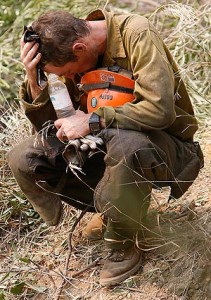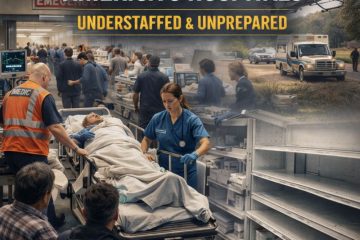 When people ask me about what type of fuel they should have on hand for emergencies, I just can’t seem to answer their question simply. Instead, I just have to share with them the one fuel that folks tend to overlook most of all—their own physical energy. Ultimately, I can’t say this enough. The number on energy you need to be concerned about is your own physical energy.
When people ask me about what type of fuel they should have on hand for emergencies, I just can’t seem to answer their question simply. Instead, I just have to share with them the one fuel that folks tend to overlook most of all—their own physical energy. Ultimately, I can’t say this enough. The number on energy you need to be concerned about is your own physical energy.
Energy and Fuel Sources
Simply speaking, when it comes to preparing with a particular type of fuel for heat, light, and cooking, I believe in having a bit of everything so that I don’t put all of my eggs in one basket. Solar, propane, butane, isopropyl alcohol, charcoal, firewood, kerosene, etc. are all fuels that I recommend having on hand along with the proper tools which can utilize them. But in all of my preparedness efforts, as well as in my everyday life, I focus a lot on the consequences of my preparedness efforts as it relates to the consumption of physical energy. I have found that doing so leads me to make more logical and thus wise decisions in my preparedness efforts. The bottom line is that when it comes to preparedness, it’s wise to assume that you and your family may be physically compromised compared to your easy living today amidst comfort and convenience.
For example, right now, today, there are thousands of persons who are enjoying a meal that they picked up in a drive-thru window somewhere or that they popped in a microwave or a toaster oven. However, in a time of great challenge, the electrical conveniences may not be available or the monies required for such conveniences in foraging for food may be unrealistic as well. I know plenty of persons in my circle of friends that feel physically challenged when they have to cook 2 or 3 times a week. Likewise, I also have a couple of girlfriends who would eat more salad in their home if they didn’t have to “do all of that work” to prepare it. While it’s a bit comical to hear such today, imagine what kind of grumbling there might be if these same persons had to cook 3 meals a day in a camping-type of scenario? On top of that we could add the additional physical labors that would be required to fetch and clean the water, hand-clean the laundry and the dishes, and basic grooming. With all of that, who really thinks it would be wise to PLAN on having to walk a couple of blocks or so just to get water from a “nearby” lake or other water source?
 Let’s also remember that it’s very likely that such a challenging time will also compromise the strength of our immune systems. Just the stress alone which would accompany such challenging circumstances could take a toll on our immune systems. So think about what it might be like to have to chop wood, boil water, cook 3 meals a day, hand wash the laundry, hunt for food, sentry the homestead, and walk to the nearest potential supply for medicinal help—all while running a fever. This is why I don’t just plan for reactive medical care, I place a heavy emphasis on preventative medical supplies as well. Just a little bit of planning now can make all the difference in the world later, during more trying times.
Let’s also remember that it’s very likely that such a challenging time will also compromise the strength of our immune systems. Just the stress alone which would accompany such challenging circumstances could take a toll on our immune systems. So think about what it might be like to have to chop wood, boil water, cook 3 meals a day, hand wash the laundry, hunt for food, sentry the homestead, and walk to the nearest potential supply for medicinal help—all while running a fever. This is why I don’t just plan for reactive medical care, I place a heavy emphasis on preventative medical supplies as well. Just a little bit of planning now can make all the difference in the world later, during more trying times.
Keep in mind I’m not solely referring to a time of financial collapse or a national power grid failure. Preventing unnecessary physical energy exertion can be applicable even today. For example, when I’m not feeling my very best, it means that my husband has to come up with meals. While, yes, I do believe I married well, he’s “culinarily challenged.” *grin* So, whenever I’m down it used to mean that we’d spend ridiculous amounts of money on food that was at the very least compromised nutritionally. In order to avoid such difficulty in the future, I’ve taken time to create very simple “open, dump’ heat” recipes for him to use. There are also days in which I don’t feel like playing the entire symphony in the kitchen, so having such recipes and the food resources and tools in order to create abbreviated success makes things less physically taxing, and are indeed a welcome blessing.
 Carrying this premise over into other areas of a tougher time of living means that we’ll be better served if we think of a lot of “what if” scenarios. For example, conserving physical energy means that we don’t exert the physical energy necessary to bury the dead until we are physically strong ourselves—unless the persons died as the result of a contagious disease. Having some alternative form of transportation, even something as simple as a skateboard, bike, or wagon, dolly, wheelbarrow, etc. can alleviate unnecessary physical strain. Take this same approach when it comes to mealtime. Make sure that your food preparations are easy for you and non-taxing mentally. I can tell my husband all day long that making such and such is easy. But until he’s actually done it for himself and sees how easy a particular dish was to prepare, inevitably it gives him some unnecessary stress. Mental stress is one of the fastest ways to exert valuable physical energy. When it comes to preparing to conserve physical energy in this manner, I always recommend practicing now how to do thing like making bread, sprouting, etc. so that it’s “easy peezy” to you mentally and physically later on when your body’s energy may be in high demand.
Carrying this premise over into other areas of a tougher time of living means that we’ll be better served if we think of a lot of “what if” scenarios. For example, conserving physical energy means that we don’t exert the physical energy necessary to bury the dead until we are physically strong ourselves—unless the persons died as the result of a contagious disease. Having some alternative form of transportation, even something as simple as a skateboard, bike, or wagon, dolly, wheelbarrow, etc. can alleviate unnecessary physical strain. Take this same approach when it comes to mealtime. Make sure that your food preparations are easy for you and non-taxing mentally. I can tell my husband all day long that making such and such is easy. But until he’s actually done it for himself and sees how easy a particular dish was to prepare, inevitably it gives him some unnecessary stress. Mental stress is one of the fastest ways to exert valuable physical energy. When it comes to preparing to conserve physical energy in this manner, I always recommend practicing now how to do thing like making bread, sprouting, etc. so that it’s “easy peezy” to you mentally and physically later on when your body’s energy may be in high demand.
Another consideration for physical conservation may be caring for others who are ill. Having the right tools for basic medical care now, will prevent a whole lot of physical taxation later for both you and the patient. Ensuring that you have water that’s EASILY accessible is obviously critical when you consider it from this perspective too.
Energy and Water
 Ironically, having plenty of water that’s easily accessible plays a dual purpose. One, in that you’re not having to exert too much physical energy obtaining it and cleaning it, but the other aspect is that you’re body’s first cry for nutrition met with oxygen and then water. You’re physical energy will always be directly tied to the amount of proper hydration you provide your body–real water–not soda pop, punches, and coffee. (This is yet another reason why I “tsk tsk” people who think they are going to go “fetch” their water somewhere instead of having plenty of it on hand.) Believe me, a person will be kicking themselves later on down the road when they realize how difficult getting enough safe water is in the midst of a trial, when they could have eliminated such difficulty with some very simple actions earlier.
Ironically, having plenty of water that’s easily accessible plays a dual purpose. One, in that you’re not having to exert too much physical energy obtaining it and cleaning it, but the other aspect is that you’re body’s first cry for nutrition met with oxygen and then water. You’re physical energy will always be directly tied to the amount of proper hydration you provide your body–real water–not soda pop, punches, and coffee. (This is yet another reason why I “tsk tsk” people who think they are going to go “fetch” their water somewhere instead of having plenty of it on hand.) Believe me, a person will be kicking themselves later on down the road when they realize how difficult getting enough safe water is in the midst of a trial, when they could have eliminated such difficulty with some very simple actions earlier.
I always half-jokingly tell people that I’m the laziest Preparedness Person they will ever meet. I say “half-jokingly” because I actually am deliberate in finding the absolute easiest ways to do things, and obviously, it’s really all in the name of conserving physical energy. Since I can’t bottle or salt preserve physical energy, I’m very conscientious about the other methods I use for my independence which will undoubtedly make my life easier even when the chips are down. I find it foolish that Americans, in particular, spend a small fortune every year in pursuit of learning the newest time management craze, because in reality they are failing to recognize that it’s not really time we manage, but physical energy. I consider any money that I need to spend to enhance this critical conservation to be well spent indeed. Items like pressure cookers, hand-cranked laundry machines, solar ovens, Water Pasteurization Indicators (WAPIs), hand-cranked beaters, freeze-dried produce, batteries for operating the food processor or wheat grinder, treadle sewing machines, and other items like these all are a part of my “lazy independence.” Hopefully, as you consider your “what ifs” in the future, you’ll remember to apply this critical consideration as well.



3 Comments
Linda Harper · September 8, 2010 at 10:17 pm
Great post! I agree 100% We just got a huge water barrel and are looking into rain harvesting to have other water to use around the home. I have started canning some convenience foods including vegetable beef soup and chili, etc. so when we have busy days we have something to just heat and eat! I also have canned a lot of meat so it’s already cooks and ready to add to a recipe for a quick meal.
Cin · September 9, 2010 at 10:42 am
Fairly cheap with a long shelf life is Sterno for cooking. Get a steady little Sterno camp stove and a couple of cases of Sterno for a great little backup energy source. It requires no personal energy to operate, and little storage space. Oh why not have two put back for an emergency? It can be used for hiking, camping, or a road trip. Its not going to be like cooking on a four burner stove, but it will heat a decent pot of stew, soup, or combination of your choice.
Kellene is dead on with personal energy. Eat well, get lots of “quiet” rest, and stay very hydrated. They are the top reasons people’s immune systems start to break down. The quiet rest I mentioned is a good sleep in a dark room without the radio and tv running. Use drape liners if you work nights and sleep in the day. These things can interfere with our sleeping patterns. Also try to have the same sleeping schedule every night and keep to it.
Norma · September 29, 2013 at 11:48 pm
Great tips and Kellene points
Great tips and Kellene points out something I’ve never heard ANYONE else talk about. Lots of people even now when we have grid and conveniences are suffering stress and dehydration. Imagine how much more difficult this will be when SHTF.
I’m going to start rethinking my strategies with this “physical engergy” focus and see if I can lighten some of my load in the future. I have much more grid energy and resources at present to rearrange things better, I’m sure!
Thanks all,
Norma
Comments are closed.